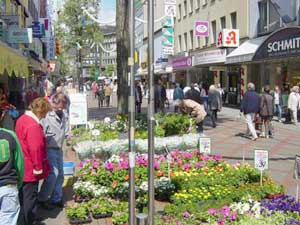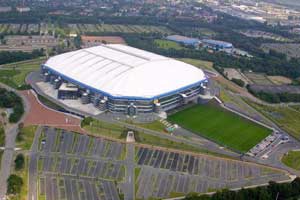
Germany 2006 FIFA World Cup VenuesFIFA World Cup Host Cities - GELSENKIRCHENGelsenkirchen city profile
The city is ideally located for a FIFA World Cup Host City. Fellow Host City Dortmund is just 30 minutes away by motorway, while the stadium in Cologne can be reached in an hour. Some 6.4 million people live within a 50 kilometre radius of Gelsenkirchen. Energy is another subject close to the city’s heart. As with the whole of the Ruhr Valley, Gelsenkirchen was once dominated by the coal industry. Today, the city is more renowned for cleaner solar energy and has developed into a national business and research centre for solar technology. However, it is not only industrial romanticism that attracts visitors to the former mining town. Visitors to Schloss Horst can enjoy a journey back to the Renaissance period with organised tours through the magnificently restored palace. And for those who prefer to look to the future, there is a solar exhibition in the science park. The lights in the solar city do not go out after the final whistle. Lovers of the stage, ballet and opera will be perfectly at home in the Musiktheater im Revier (MiR). In fact they will be spoilt for choice, for no other European city can boast so many theatres and museums in such a concentrated area as that in the Ruhr between Duisburg and Hamm. Football fans can preserve their energy for upcoming games by relaxing in the countless peaceful green areas around the city. The sacred turf of the Arena is far from the only attractive greenery in Gelsenkirchen, with around a third of the city dedicated to parks, forests and meadows, including the parkland at the Schloss Berge, the Nordsternpark, former site of the Federal German Garden Exhibition, the Nienhausen Revierpark or forests such at the Resser Mark. The “Erlebniswelt Zoom” wildlife park also gives visitors the opportunity to observe animals from Africa, Asia and Alaska. Major events at the former Gelsenkirchen Arena AufSchalke
Gelsenkirchen stadium profilePopulation: 278,000Stadium: FIFA World Cup Stadium Gelsenkirchen Project: New stadium Investment: 191 million Euro Gross Capacity: 53,804 Total Seating Capacity: 48,426 (*) Purchasable Ticket Capacity (**)
“This stadium is a pilot project for the whole world”, praised FIFA President Joseph S. Blatter. The Champions League Final was staged here on 27 May 2004. The €191 FIFA World Cup Stadium Gelsenkirchen project was entirely financed by private capital, at no cost whatsoever to the public purse. FIFA paid an official visit to Gelsenkirchen in 2002 for the ceremonial unveiling of the Official Emblem. The "Celebrating Faces of Football“ were projected onto a fifteen-foot high wall of water in the centre of the pitch. The Arena, lauded by former minister-president Wolfgang Clement as “football’s crowning glory,” can justifiably claim to be the most modern in Europe thanks to an array of ground-breaking technical facilities set to revolutionise standards in stadium design, including a removable playing surface, giant video cube, a retractable roof and electronic admission controls. By early 2005, the Arena had staged more than 150 events and attracted over eight million spectators. Schalke 04, who celebrated their centenary in 2004, play their home games here. Financing: (*) "Total Seating Capacity" means the Gross Capacity less the seats unavailable for use due to restricted views and security/contingency reserves for the 2006 FIFA World Cup. This capacity is estimated and may change once these deductions are finally determined.
|
|||||||||||||||||||||||
Recommended Sportsbook
Bookmaker Sportsbook is a recognized sports betting leader since 1985. BookMaker provides safe, legal, and secure betting on major sporting events, as well as horse racing, casino, and poker entertainment, from any location in the world, 24 hours a day 7 days a week. Bookmaker is the number one legal online sports betting and entertainment center of America. Bonded and fully licensed by the Government of Costa Rica. With a reputation like this everyone should have an account.
Bookmaker covers all needs for any real gambler. If you do not have an account with Bookmaker you are making a very big mistake. Signing up now is better than ever as gives you the best bonuses available. With an array of bonuses and the best reputation, Bookmaker is a must have for A list sportsbook betting fans. Sign up today!
 But nothing brings the people of Gelsenkirchen together more so than football. The sport enjoys both a great tradition – with FC Schalke 04 having brought seven league titles to the city – and passionate supporters. The Aufschalke Arena is regularly sold out at home games.
But nothing brings the people of Gelsenkirchen together more so than football. The sport enjoys both a great tradition – with FC Schalke 04 having brought seven league titles to the city – and passionate supporters. The Aufschalke Arena is regularly sold out at home games.  The Arena was officially opened on 13 and 14 August 2001, immediately setting a new benchmark in the art of stadium construction. European governing body UEFA assigned the multifunctional Arena to the highest-possible five-star category, commenting: "This venue more than fulfils the necessary criteria, and might even qualify as a 'Six-star stadium'."
The Arena was officially opened on 13 and 14 August 2001, immediately setting a new benchmark in the art of stadium construction. European governing body UEFA assigned the multifunctional Arena to the highest-possible five-star category, commenting: "This venue more than fulfils the necessary criteria, and might even qualify as a 'Six-star stadium'."